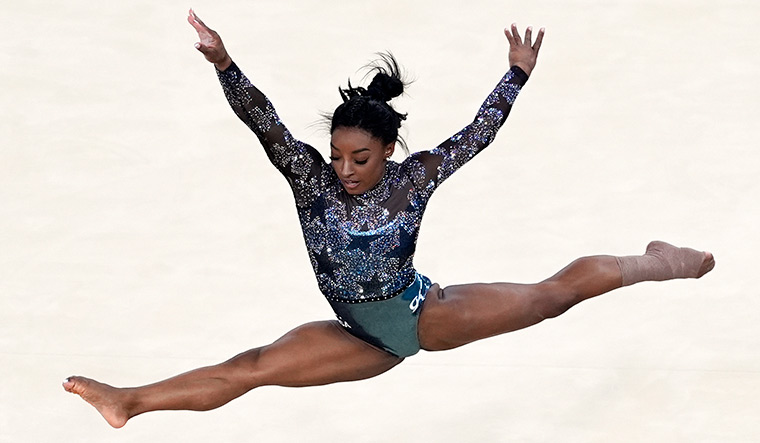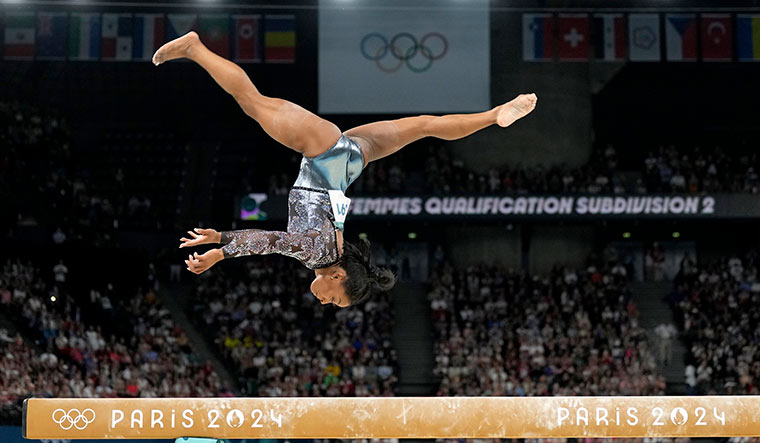Interview/ Simone Biles, four-time Olympic gold medallist
Three years ago, Simone Biles was heralded as the star of the Tokyo Games. Medals and records were predicted. But her Olympic adventure was cut short. A victim of the “twisties”, that uncontrollable and dangerous loss of bearings in space, the American had to withdraw from the competition to preserve her mental health. Now back at the Games, she is performing better than ever―at the time of going to print, she has made it to five finals―and knows what is at stake. “It is an opportunity for redemption,” she said when her selection was announced.
At 27, Simone Biles remains the star who must shine in Paris. In an interview, she opened up about what she has been through since those four Rio Olympic titles, and the conversation revealed a young woman who is fulfilled but accepts her flaws.
Q/ Do you remember the young Simone Biles making her World Championships debut in 2013?
A/ Yes, I was very bubbly, outgoing, a little hyperactive. I still needed my ADHD (attention deficit hyperactivity disorder) medication, but I was also very optimistic. With one goal in mind, which was obviously to compete in the Games one day. The 2013 Worlds allowed me to start believing in myself and my gymnastics.
Q/ Then there was Rio, a masterful comeback in 2018 despite your admission of being one of the victims of sex offender Larry Nassar, the former US gymnastics team doctor. And of course Tokyo....
A/ Before Tokyo, I had a feeling. I probably knew I was going into depression. But something in me blocked it out. The pressure was enormous, there was no room for error, victories were promised, I was going to break records. It is nice to be recognised for your sporting merit. And I think everyone wants to be famous. But when that happens, you hit a wall and face an identity crisis. How did I get here? Is this really what I wanted?
Q/ What do you think of the Tokyo Games?
A/ They were not what the Games are all about. In theory, it is a time when the world comes together, when athletes strive for excellence but also experience amazing stories, camaraderie and exchanges. But, because of the (Covid-19) pandemic, we were confined. When we were not training, we were locked in our rooms, unable to hang out in the corridors, play cards or chat. It was suffocating, physically and mentally demanding. I feel sad when I think of these athletes who will only have experienced these silent Games. The world was on pause, but we were not. And it was unfair even to our loved ones back home. We may have felt guilty, but... (hesitates) we did the best we could, adapting to the situation.
Q/ What do you remember about what happened?
A/ It definitely was not what we had planned.... I realised that I just wanted to get out of the room and take care of my mental health. I knew the healing process would be long. But I was also convinced that I would make it. As the three words tattooed on my left collarbone, ‘Still I Rise’ (a poem by Maya Angelou), sum it up, I have always known how to face life’s challenges.
Q/ How did you manage it?
A/ To be honest, between Tokyo and my testimony before the US Congress (in September 2021) in the Nassar case, I seriously considered retirement. I was devastated. When I stopped after the 2016 Games (she took a break), I made the most of it. I was depressed until I started therapy. I felt like a failure. Even if I talked about mental health or tried to empower people on the issue, it was like a wake-up call at the mention of Tokyo. But I also realised that I did not want to have any regrets in 10 or 15 years’ time.
Q/ Did you miss gymnastics?
A/ I do not know if it was a physical lack [of training and competition], but I started going to the gym again. I would drop in, laugh with the girls, do a couple of things. And I could be gone for days before I would set foot in the gym again. It was a bit scary. I did not know if I could start again and progress. I did not know where I was going, but I explored this path at my own pace and because I wanted to. Nobody forced me to get up in the morning and spend hours training. It was a very personal, intimate decision.
 Simone Biles | AP
Simone Biles | AP
Q/ In April 2023, you married Jonathan Owens, a player with the Chicago Bears in the NFL. What does this mean for you?
A/ People think that if you become a wife, you cannot be a professional athlete anymore. But of course you can! I was married to gymnastics, but now it is just a part of my life. At the end of a session, I go home to my husband, my dogs, my activities.... It is a different kind of balance. And that makes me very happy.
Q/ When you are training, we are surprised to see you laughing so much...
A/ I think I love gymnastics even more than before. Of course, I have the distinctions that help me get through the days when it is more complicated physically or technically. But I do not have to prove anything any more, I do not have to win the World Championships or the Olympic Games. I have rediscovered my love of sport, the fun of it and the joy it brings me. I still have sporting goals, things I would like to achieve. But I do not think I will be disappointed if I do not succeed.
Q/ At the same time, as soon as you returned to competition, you appeared stronger than ever. How do you explain this?
A/ What you felt was a far cry from what I experienced (laughs). Of course, I felt like I was back in my element and that was pretty exciting. But I was really petrified. In Chicago, for example (August 5, 2023, her first official competition after Tokyo), I was very nervous.... Allowing myself to be vulnerable in front of an audience was a risk, but already a victory for me. On the other hand, I was anxious about what people would still say...
Q/ Why was that?
A/ In Tokyo, I received a lot of negative messages and insults. That I was weak, a coward, selfish, that I had taken the place of a more deserving gymnast. That it was because of me that the American team had not won the gold medal... It was extremely violent and unfair. I should not have paid attention to those [people]; I tried, but I could not help it. On the other hand, I knew that the gym community understood what I was going through. But then there were all these people who put me on a pedestal because I was becoming an advocate for mental health in sport. But I did not want them to stick me there, facing the crowd, saying, “Do what she did.”
Q/ And yet, in Chicago, tens of thousands of people came to salute your talent and courage.
A/ I was shocked! The packed auditorium, all those children with signs encouraging me, thanking me, applauding me... It was nice and reassuring to see that they had not abandoned me. But I have always refused to let that support blind me. Like in a bad movie, you wonder how many will boo you and throw rotten tomatoes at you. It is not the majority, but they want to see you fail. And I have already experienced the madness that follows a fall.
Q/ Do you think that is still the case?
A/ Oh, yes! On the margins perhaps, but I still read hurtful comments, saying, “Are you going to escape again?” Only, I am capable of striking back. To reply: “So what will you do if it happens again? Tweet?” I have had time to toughen up and come to terms with these critics over the past three years. There are also unconditional supporters.
Q/ Watching you, gymnastics even seems to have become a team sport without borders...
A/ I think that is because we are trying, at our level, to change the culture. Under the pretext of being in competition, we should oppose our opponents? I refuse to accept that this is inevitable.
Q/ But you go further by cheering on your rivals in competition...
A/ And why shouldn’t I? We all respect each other because we have all grown up under the same constraints, swallowing the same hours of training and suffering the same injuries. We regularly bump into each other at major championships, and we have forged bonds of respect and friendship. Why stick to old patterns, when geopolitics pitted one girl against another? It is silly to think that you have to hate each other to concentrate and succeed.... At the end of the day, I do not want to go home thinking: “The atmosphere was horrible, but I have got medals.”
Q/ While you are on the subject, what do you think of your record of achievements?
A/ I do not chase records, I leave that to the journalists. What drives me is raw performance. No doubt that explains the five difficulties (skills) to my name. Of course, I hope that one day, with my husband, we will have a nice collection of trophies to show our children. But it seems unreal when I hear that I am placed next to great athletes like LeBron James or Serena Williams. I know I inspire little girls with my perseverance, determination and courage, too. It is these traits I have developed throughout my journey that I want to keep.


